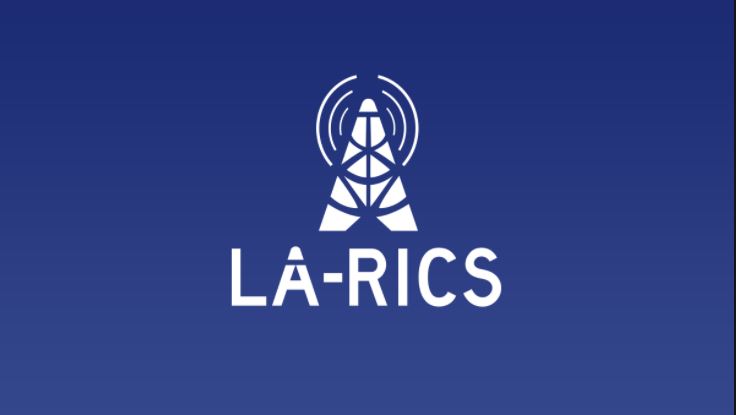LA-RICS hopes P25 network from Motorola Solutions will be ready in October 2023
It will be at least two more years before first responders will be able to use a completed Los Angeles Regional Interoperable Communications System (LA-RICS) P25 system being built by Motorola Solutions that already is about a year behind schedule, LA-RICS board members were informed yesterday.
During yesterday’s meeting of the LA-RICS Joint Powers Authority board, LA-RICS Executive Director Scott Edson indicated that officials for LA-RICS and Motorola Solution have agreed in principle on a long-awaited integrated master schedule (IMS) with a October 5, 2023, date for LA-RICS to accept the completed system.
“We met with Motorola [Solutions] yesterday and are awaiting parties to execute a work acceptance certificate for the integrated master schedule, showing a system-acceptance date in October of 2023,” Edson said in his presentation during the LA-RICS board meeting that was conducted virtually on Thursday.
“The IMS shows an acceptance of subsystems via a phased approach, versus accepting the overall system at once. In discussions with Motorola yesterday, we believe the work-acceptance certificate and amendment can be executed next week, while the parties negotiate breaking out payments for subsystem acceptance in another future amendment.”
Of the 58 P25 tower sites in the P25 network, 47 have been completed, according to information in the agenda packet created for the LA-RICS board meeting. Most of the remaining sites are in the process of being constructed, with two sites still needing to be started, the agenda documentation states.
Edson acknowledged that LA-RICS would be paying Motorola Solutions more money to finish the P25 system, although he did not announce an estimate figure for the increased cost. LA-RICS is preparing an application to get federal funding through the UASI 2022 grant program, he said.
“I have met with certain members in the region, and they have expressed their continued support for interoperable communications in the region and the funding needed to complete this project,” Edson said. “We are working with the county CEO and the city of Los Angeles mayor’s office to prepare our application for the UASI 2022 grant cycle.
“I do want to assure the board that any item presented to the board is fully funded under existing award grants. And as the board is aware, our approval grant spending plan and—as the region refers to it—grant workbook includes a contingency line item that sets aside grant funding to pay for unforeseen changes in site costs and site conditions, weather impacts, etc. Every item presented to the board that results in a cost increase in the contract identifies a fund source within our approved grant spending plan.”
Los Angeles County Fire Chief Daryl Osby—a member of the LA-RICS board—expressed concern that he previously was informed that the IMS would be finalized in August, but “here we are in September, and it’s still not done.”
Edson responded by saying that “there will be great detail about the IMS in our closed session today … and we will be happy to answer any questions at that time.”
Indeed, the LA-RICS board met in closed session for more than 20 minutes, but no findings or details from the closed session were disclosed when the LA-RICS board reconvened to adjourn the meeting.
According to the agenda for the LA-RICS board meeting, the justification provided for the closed session was “conference with legal counsel—anticipated litigation.”
Having an IMS with a completion is important for local agencies trying to make budget plans around the transition to the new LA-RICS P25 network from their existing LMR systems.
“While the team works toward a consensus IMS, one of the top questions the team receives from agencies eager to onboard the LA-RICS system is when will the system go live,” according to minutes from the LA-RICS board meeting conducted in May. “They have radio and equipment purchases on hold, pending that confirmation.”
If finalized, an approved IMS would mark the arguably the most encouraging tangible step in the process associated with deploying the LA-RICS P25 system during the past couple of years. It also would represent a significant level of conciliation compared to the spring and early summer, when LA-RICS officials were expressing frustrations with the performance and practices of Motorola Solutions.
LA-RICS officials initially expected to accept the finished LMR system in 2020. Earlier this year, LA-RICS received an “information-only” document from Motorola Solutions estimating a project end date of February 2023, according to LA-RICS board minutes.
When asked in June to explain the reasons for the P25 project being behind schedule, Edson told IWCE’s Urgent Communications, “We were supposed to be done by now, but fires, floods, the pandemic, resources, supply-chain issues and some preventable delays have further delayed the program.”
Edson declined to elaborate on the “preventable delays” he referenced, but the approved minutes from previous board LA-RICS board meetings revealed several points of contention with Motorola Solutions regarding its performance on the project.
Among the issues cited in the minutes were the inability of Motorola Solutions (MSI) to complete tasks on time and to submit an integrated master schedule (IMS), which LA-RICS officials perceived as a contractual default.
“The LA-RICS team is in constant communication with the MSI team based on their performance and ability to produce and adhere to a schedule,” according to minutes of the LA-RICS board meeting in April. “As you know, we believed we had reached consensus in December of 2020, only for MSI to remove its backing of the schedule. We continue to manage to the schedule to the greatest extent possible, while simultaneously requesting MSI and Liberty Mutual—MSI’s bonding company—resolve MSI’s default …
“The MSI program director also commented that, while MSI is working from the ‘information only’ IMS documents submitted each month, he is not willing to submit them for approval, nor is he confident in meeting the expressed finish date [of February 2023 at the time], especially without a settlement over a Dec. 31, 2019, rejected change-order request in the amount of $55 million.”
In the minutes of the LA-RICS board meeting in May, it is noted that the LA-RICS “team has run into issues where MSI presents unreasonable change orders that, if not approved, result in a halt of their site work.”
Motorola Solutions’ stance in the face of these allegations publicly has not been clear. Although the vendor giant has submitted monthly progress reports to LA-RICS, those reports have not been submitted to the LA-RICS board, according to board-meeting minutes.
“MSI has submitted its monthly reports so late that it has made it difficult, if not impossible, to thoroughly vet them and require changes from MSI prior to delivering them to the JPA Board,” according to the minutes of the May meeting. “The most recent monthly reports from MSI have contained numerous inaccurate, or false statements and/or misleading statements regarding acceptance of the current master schedule, notices of constructive delays, lease agreements, zoning approvals, power, and agency cutovers.
“Their most recent report—number 93—has followed the pattern of late submission and inaccurate content, so it is not being provided to the JPA Board as a result.”
Motorola Solutions did not respond to numerous attempts by IWCE’s Urgent Communications this summer seeking these monthly reports to LA-RICS or a summary of their contents.
Deploying P25 has proven to be challenging for LA-RICS, which has been pursuing the goal for more than a decade. After LA-RICS first awarded a $600 million both the LMR and LTE networks to Raytheon in a bidding process initiated in 2010, a legal technicality uncovered in 2011 resulted in both systems being procured separately.
When the LMR project was rebid, Motorola Solutions was select and signed a contract with LA-RICS for the LMR system in August 2013. Motorola Solutions subsequently also was chosen to build the LTE network, signing a contract to deploy the LA-RICS broadband wireless in March 2014.
The scope of both the P25 and LTE networks for LA-RICS were reduced significantly in 2015—largely by redesign on the LTE side of the project in the spring of that year—in part because of claims of RF dangers from the local firefighters’ union. The 232-site LTE plan was pared to 77 sites and eventually 76 sites. In 2018, the 76 sites were transferred to AT&T for FirstNet, and LA-RICS later built another 26 LTE sites that were transferred to AT&T for the FirstNet initiative.
Meanwhile, the LA-RICS P25 project was reduced from more than 80 sites to 60 sites, in part because the city of Los Angeles opted to pull out of the regional initiative in November 2015.
















